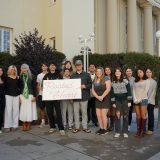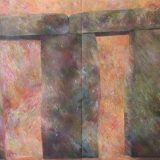Millie Wilson: Light and Memory Art Installation in Smith Hall
November 3, 2021
Millie Wilson’s light box photos are a series of haunting and humorous works that poke at stereotypes, gendered situations, and the mundanity of everyday life. The Escalette Collection of Art has two works of Wilson’s on display in Smith Hall: Untitled (boys in desert) from her 2013 exhibition Some People, and an earlier 2011 work, Untitled (dog and bone). Using found photos, she creates small scenes, with light pouring from behind her subjects and into the outer world.

Millie Wilson, Untitled (dog and bone) & Untitled (boys in desert), color transparency in aluminum light box, 2011 & 2013.
These light box images are haunting renditions of other people’s memories, making the viewer an intruder on past lives. The ambiguity of the photos, their origins, and their subjects allows the memories to belong to any viewer. I feel a certain sense of nostalgia when I look at these works as they loom over Smith Hall’s stairway, floating in their little boxes, the metal blending in with the wall behind it. The dog dances in someone’s living room in front of a 70s era television set. The boys stare out from a backdrop of blue skies and red sands, coming to life in the eyes of the students who pass by them every day.
Wilson’s works tap into a well of old Americana, a collective identity and memory that many people living in the States today relate to, even if they were born after the time period of these photos. It is impressive that so much is drawn out of an image in a simple light box; the physical layers of aluminum, light, and color transparency mirroring the layers of ideas and emotions these works evoke. This evocation turns specific scenes into ambiguous ones, moments frozen in time into endless memories stretching back across generations.
In my work I have used the frame of the museum to propose a secret history of modernity informed by queer sexuality, femininity, race and class. I have used humor, parody and homage to point to stereotypes of difference. I have found the histories of surrealism and minimalism to be useful in the rearranging of received ideas. The objects I make are placed in the canon of modernist art in hopes of making visible what is overlooked in the historicizing of the artist as subject and citizen.
In Looks Bad, what I attempt to make visible is suggested through the telling details of vernacular photographs. They are selected from a large archive of found images, and with each new grouping I allow for a number of possible readings to arise, ranging from formal qualities, gestures, and normative relations, to manufactured objects, gender, anomalies and “ghosts.”
I think of my installations as unfinished inventories of fragments: objects, photographs and other inventions; as improvisational sites where the constructed and the readymade are used to question our making of the world through language and knowledge. – Millie Wilson for Iceberg Projects
We invite you to explore all the works in the Escalette Collection by visiting our eMuseum.
Wilkinson College of Arts, Humanities, and Social Sciences is the proud home of the Phyllis and Ross Escalette Permanent Collection of Art. The Escalette Collection exists to inspire critical thinking, foster interdisciplinary discovery, and strengthen bonds with the community. Beyond its role in curating art in public spaces, the Escalette is a learning laboratory that offers diverse opportunities for student and engagement and research, and involvement with the wider community. The collection is free and open to the public to view.



